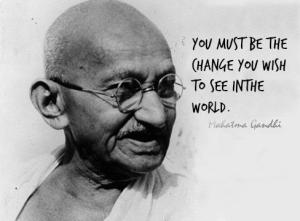Back in March, I presented at a professional conference and spoke on the many changes we are seeing in healthcare generally, and medical records/health information management (HIM) specifically.
In my professional sphere, like my spiritual circles, I’m the one at the party who dares to say the quiet part out loud. Like I’ve been saying about organized spiritual metaphysics, things are rapidly evolving in healthcare, and those who want to cling to the way we’ve always done it are in for a rude awakening.

It’s no longer just me saying these things. Academic programs in this corner of the industry have begun to update their curricular offerings absent a pathway to the credential.
Why?
The world has changed and moved on, AND (this may be hard for some folks to read): the credential and the expertise it represents aren’t valued in the industry as they once were.
Are there colleagues of mine who are stomping their feet and pointing at their framed, credential certificate and insisting that “no one can do the work WE do!” ?
Yep.
Will they be able to stop the changes?
Not a chance.
The industry has found technology options that can accomplish many of the tasks once performed by individuals with specialized knowledge. It has also recognized that some of those tasks are obsolete.
Example: 20 years ago, when (hospital accreditors) The Joint Commission (TJC) showed up for a site visit, the Director of Medical Records (HIM) was one of the first people summoned to the front office.
The reason? Checking for unsigned paper medical records was a large component of the accreditation site visit (& a pain point for the hospital).
About a decade ago, I began to notice changes such as the accreditation agency eliminating metrics specific to medical records, and adding metrics more specific to patient safety, and paying closer attention to the environment of care.
In the highly connected world we live in today, finding unsigned records doesn’t require the HIM Director to unlock the records room and allow the accreditation team to pull random records to flip through, seeking an unsigned note. All that needs to happen is for someone – anyone with appropriate access – to pull a report from the now-electronic medical records system, and instead of assessing the random sample (a few records), they can see if there are ANY in the entire facility, and in much less time.
I saw the changing importance of the traditional duties in my profession in stark clarity when, in 2017, TJC showed up for a site visit and I was never once contacted. I remember thinking: “We’re not in Kansas – or the 20th century – any more!”
It’s heartening to see some corners of academia pivoting to embrace the realities of the day. It shows that thinking people with a clear eye on what’s happening all around them are at the helm and making often-difficult decisions that will help them ride the waves of change to that new tomorrow – whatever and wherever that may be.
Back in 2010, I ended up being a very unpopular speaker at a local conference when I suggested that, like Medical Transcription (a once viable profession that was replaced by technology), medical coding and billing was going to be replaced.
As the transcriptionists did when I told them the same thing years before, the coding professionals stomped their feet, shook their heads and pronounced me a “negative person”.
Hmmmm, I’ve heard that before! (side eye at the metaphysical spiritual community).
The truth of the matter is that history has shown that being realistic about what’s obviously unfolding in front of our eyes isn’t “being negative”; it’s being astute.
Instead of wringing my hands and stomping my feet about the changes in my profession, I’ve made sure – over the years – that I added and enhanced skills that are transferable and valued in the workplace. I’ve made inroads into other industries, and accepted that change is a natural part of life.
I don’t see that happening in organized spiritual metaphysics. Instead of accepting the reality of the day and pivoting to find their place in the new moment; most in the organization are digging in because “Ernest Holmes said we should turn away from reality and know the truth!”
How’s that been working so far?
In my professional world, people are having to face the fact that the experience, expertise and knowledge base grounded in the past is largely irrelevant and will not provide a viable foundation for the future. Some are retiring; others are leaving to move into a whole new profession and some are up-skilling in their current roles so to be able to lead change from within – understanding that it’s likely to look and be a LOT different from “the way it always was,…”.
That’s life. The folks in this corner of healthcare who accept the changes as part of the natural life cycle will be successful. The ones who don’t will find themselves increasingly marginalized, out of touch and eventually – out of work.
My next blog post is going to address visioning, which is listed as a “tool” by the largest spiritual metaphysics organization, so I’m not going down that rabbit hole here; but I do wonder how many centers, ministers or practitioners are visioning furiously to change the trajectory of the organization’s decline.
A better use of time and energy might be to look around at what IS wanted by people in need and what may be options for the cadre of unemployed ministers they continue to churn out. There is a lot of good work to be done by people of good will, if they are more interested in doing good work than swooshing about in a robe and stole and being in the “Rev-Dr” club.
Here’s a short list of a few options:
- After school care for low income families
- Food for food banks
- Volunteers for soup kitchens
- Rides to help isolated seniors and others to get to doctor and other appointments
- Diaper collections for low-income families who are trying to balance the many expenses of life
- Offering social activities that are open and welcoming to marginalized communities
There’s a lot of opportunity available to BE the good the world needs and make a difference. It’s time to pivot away from the hand-wringing, Holmes-quoting, and looking back. It’s time to chart a new path forward.
Just remember that some of the things you were pursuing in that old model will not be featured in the new way of being. It’s a great opportunity to practice “letting go” – which is advice that folks in that Rev-Dr club should be able to heed if they’re also dishing it out to others.
(C) 2023 Practitioner’s Path
 I’m writing this from the Manchester/Boston Regional Airport as I wrap up another visit to New Hampshire where I spoke at an annual professional meeting.
I’m writing this from the Manchester/Boston Regional Airport as I wrap up another visit to New Hampshire where I spoke at an annual professional meeting.






